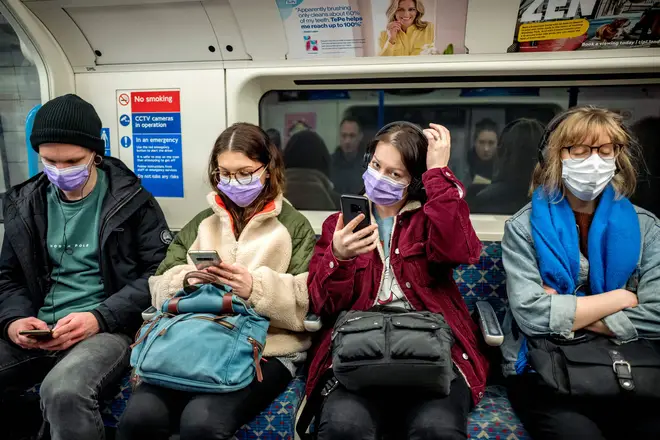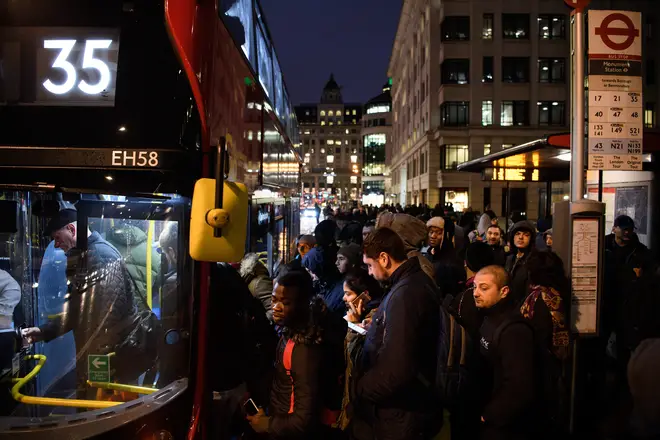
Henry Riley 7pm - 10pm
2 May 2020, 08:03

People using public transport could be asked to check their temperature before travelling under lockdown easing plans being looked at by the government.
Next week, Boris Johnson is due to reveal his measures for easing coronavirus lockdown. It is thought he will announce ways to allow people to start to return to work and children to return to school.
That plan is not expected before Thursday, which is the latest date ministers must review the emergency measures under legislation.
The Prime Minister has already spoken of his wish to kickstart the economy, and promised to deliver a "road map, a menu of options" next week on how he would get the economy moving again while still suppressing the disease's spread.
One of the places people are most concerned that disease would spread if on public transport, especially at peak rush hour times.
The Times has reported that commuters could have to take their temperatures at home before travelling and anyone with a high temperature should not travel.
A fever - a temperature above 37.8C - is one of the two main symptoms of the virus, along with a dry, continuous cough.
The Daily Telegraph has reported that social distancing rules could be reviewed in a bid to allow more businesses and schools to reopen.

Listen & subscribe: Global Player | Apple Podcasts | Google Podcasts | Spotify
At Thursday's coronavirus press conference, the Prime Minister has said the UK is "past the peak" of the virus outbreak, but stressed the country must not "risk a second spike".
Face masks, he said, would be "useful" as part of the strategy for coming out of lockdown "both for epidemiological reasons but also giving people confidence they can go back to work".
Boris Johnson suggested that coverings will play a part in his announcement on how the lockdown measures may be eased, but it is understood this will not come before next Thursday's review.
The Government had been resisting calls to recommend their use despite Scotland's First Minister Nicola Sturgeon advising the public to use cloth face coverings when in enclosed public spaces.
The Prime Minister's official spokesman acknowledged on Friday that the evidence shows they can reduce the spread of the virus from infected individuals who are not showing symptoms.
"The advice we have received based on the science shows a weak but positive effect in reducing transmission of coronavirus from asymptomatic members of the public where social distancing isn't possible," he told journalists.
Updated guidance on masks is also expected next week, though No 10 acknowledges the subject is not simple.
The PM's spokesman said Cabinet Office Minister Michael Gove was "accurately reflecting the position of the science" when he warned that face coverings could encourage people to act in a more "cavalier" manner.
Housing Secretary Robert Jenrick said wearing coverings will be a "personal choice" because they only make a "modest difference" in the fight against Covid-19

Boris Johnson suggests Brits could be asked to wear facemasks
It comes after a further 739 people were confirmed on Friday to have died, bringing the total number of deaths in hospitals, care homes and private homes to 27,510.
Some 6,201 new cases of COVID-19 were confirmed, bringing the total number of infections to 177,454.
It comes at the government announced it has reached its goal to carry out 100,000 coronavirus tests per day by the end of April.
The Health Secretary revealed that 122,347 people were tested on Thursday in an “unprecedented expansion” of capacity across the UK.
But there are doubts around how the tests are being counted, with that number believed to include tests which have been sent out to key-workers but which have not yet been completed and returned.
Mr Hancock heralded the expansion in testing beyond 100,000 a day as an "incredible achievement".
He said: "I knew that it was an audacious goal, but we needed an audacious goal, because testing is so important for getting Britain back on her feet.
"I can announce that we have met our goal. The number of tests yesterday, on the last day of April, was 122,347.
"This unprecedented expansion in British testing capability is an incredible achievement, but it is not my achievement, it is a national achievement."
The Health Secretary said that the testing capacity built would "help every single person in this country".